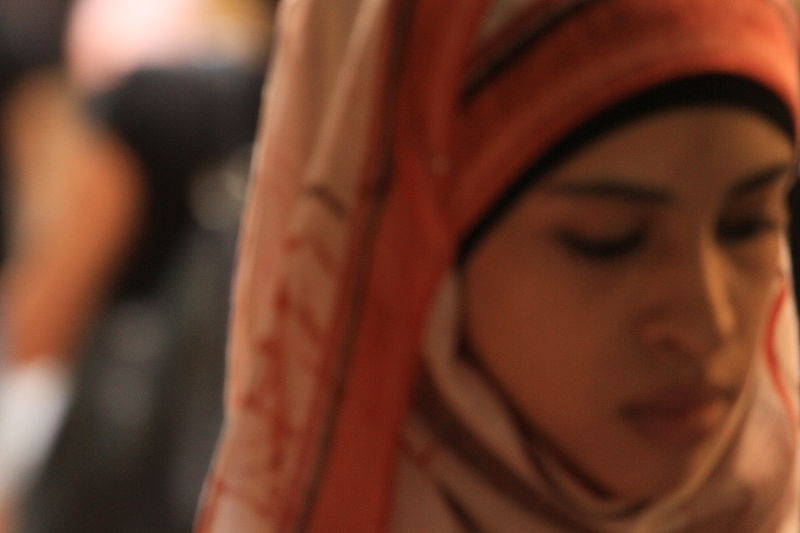
Young Palestinian Muslim woman shopping in the public Arab Market in the Old City of Jerusalem. Peter Hagyo-Kovacs/Wiki Commons
Much has been written recently (including posts on this blog) about the name ISIS, and how unfortunate it is that the girl’s name — that of the Egyptian goddess of children and motherhood — has been hijacked by the world’s newest and most frightening embodiment of organized terror. This linguistic tainting is a small reflection of how the reputation and understanding of a historical, peaceful global religion has been tarnished by the horrific deeds of a small extremist group of its believers. In this sad climate of deepening and shameful prejudice against Islam, Glossophilia is honoring its beauty by taking a glimpse at some of its poetic language.
Below — represented here in the Anglicized form of the original Arabic — is a small but representative collection of some of the words and phrases uttered by Muslims around the world on a daily basis, used to express everything from simple greetings to blessings before and after activities and actions. Listen to the music and rhythm of the words themselves, and note their meanings and sentiments, which always reflect the peaceful tenets of the faith in whose name they’re spoken.
Islam: n. The religion of the Muslims, a monotheistic faith regarded as revealed through Muhammad as the Prophet of Allah.
Etymology: from Arabic islam, literally “submission” (to the will of God), from root of aslama “he resigned, he surrendered, he submitted,” causative conjunction of salima “he was safe,” and related to salam “peace.”
“Islam is the only major religion, along with Buddhism (if we consider the name of the religion to come from Budd, the Divine Intellect, and not the Buddha), whose name is not related to a person or ethnic group, but to the central idea of the religion. [“The Heart of Islam: Enduring Values for Humanity,” Seyyed Hossein Nasr, 2002]
History: Earlier English names for the faith include Mahometry (late 15c.), Muhammadism (1610s), Islamism (1747), and Ismaelism (c. 1600), which in part is from Ishmaelite, a name formerly given (especially by Jews) to Arabs, as descendants of Ishmael, and in part from Arabic Ismailiy, name of the Shiite sect that after 765 C.E. followed the Imamship through descendants of Ismail (Arabic for Ishmael), eldest son of Jafar, the sixth Imam. The Ismailians were not numerous, but among them were the powerful Fatimid dynasty in Egypt and the Assassins, both of whom loomed large in European imagination.
Muslim: n. A follower of the religion of Islam; adj. Of or relating to the Muslims or their religion
Etymology: 1610s (n.), 1777 (adj.): from the Arabic muslim “one who submits” (to the faith), from the root of aslama, “he resigned.”
Allah: The name of God among Muslims (and Arab Christians).
Etymology: 1702, Arabic name for the Supreme Being, from Arabic Allahu, contraction of al-Ilahu, from al “the” + Ilah “God;” related to Hebrew Elohim.
Qu’ran: n. The Islamic sacred book, believed to be the word of God as dictated to Muhammad by the archangel Gabriel and written down in Arabic.
Etymology: 1876, variant spelling (preferred by scholars) of Koran, from Arabic qur’an, literally “book, reading, recitation,” from qara’a “to read.”
Ramadan: The ninth month of the Muslim year, during which strict fasting is observed from sunrise to sunset, commemorating the first revelation of the Quran to Muhammad according to Islamic belief.
Etymology: 1590s, from Arabic Ramadan (Turkish and Persian ramazan), originally “the hot month,” from ramida “be burnt, scorched” (compare Mishnaic Hebrew remetz “hot ashes, embers”). In the Islamic lunar calendar, it passes through all seasons in a cycle of about 33 years, but evidently originally it was a summer month.
~~~~~~
Alhamdulillah: meaning “praise to Allah”, used usually to express satisfaction, in response to someone asking after your well-being, or after having finished a meal.
As-salamu alaykum: a ubiquitous Muslim greeting meaning “the peace be upon you (plural)”. The typical reply to this greeting is: Wa-Alaikum-Salaam (“and upon you peace”).
Bismillah: Arabic, meaning “In the name of God” or “In the name of Allah”: the first word of the Qu’ran. An invocation used by Muslims at the beginning of any undertaking, such as eating a meal, setting out on a journey on foot or in a vehicle.
Haram: forbidden or proscribed by Islamic law. (Compare with makrooh below.)
Insha’Allah: meaning “if God wills, it will happen,” or “God-willing.” Also used by Arabic-speaking Christians and those of other faiths. In common usage, it can mean “hopefully” or “maybe” when talking about an expected future event.
Masha’Allah: “As God has willed”: this phrase is used when admiring or praising something or someone, in recognition that all good things come from God and are blessings from Him.
Makruh/Makrooh: literally means “detestable” or “abominable”; used to describe something that is disliked or offensive under Islamic law, but not necessarily forbidden (compare with haram above).
Rahimakallah: May Allah have mercy on you, or May Allah bless you. The equivalent of “bless you”, said after someone sneezes.
* * * *
Definitions from the Oxford English Dictionary, World of Islam, Islamepedia, and Wikipedia; etymologies from Online Etymology Dictionary.
